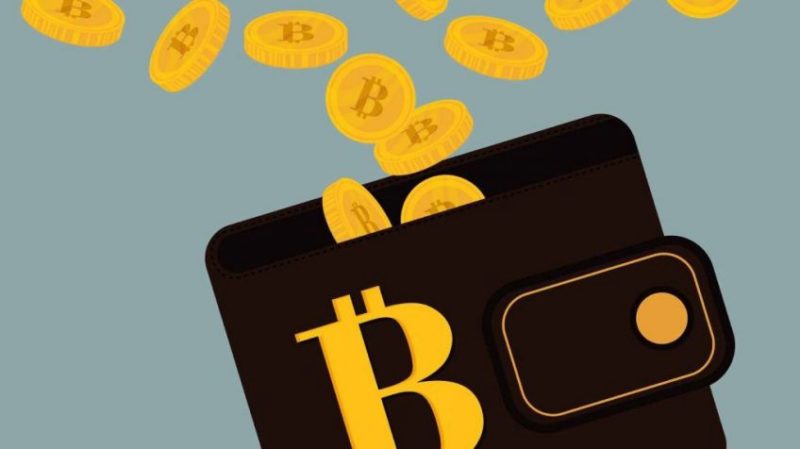A cryptocurrency wallet is a software program that enables you to store, access and interact with your coins and can be considered as the crypto version of a bank account. The main difference is that with a conventional bank account, your account number is public and is directly linked to your identity, but your transaction history is private. With crypto wallets, your transactions are public, as well as your account number (public key), but there’s no way to link a particular address to you.
Wallet address
Your wallet address is a unique string of numbers and letters (also called a public key) that people can use to send you cryptocurrency, and which is used on the blockchain to verify transactions. It can also be thought of as the crypto version of your bank account’s IBAN or SWIFT CODE in that it’s only used as an identifying number.
Because Coinmama is not a wallet provider, it’s very important that you triple check the wallet address you provide us with when buying cryptocurrency. Coinmama does not keep or store any coins, and if you make a mistake when entering your wallet address, we will have no way of retrieving your coins. This is due to the fact that transactions on Blockchain were designed to be irreversible, so once funds are transferred, they’re at the sole discretion of the receiving wallet’s private key holder.
Wallet addresses do not expire, but some providers do generate several addresses for the same wallet. This means that even if the address has changed, you should still see the funds in your wallet. You should be able to access a list of your historical addresses from within your wallet, but if you’re not sure, it would be best to contact your wallet provider.
How wallets work
In addition to the address (aka public key), your wallet also has a unique private key (or password/ PIN), which only you should know, and which you can use to access your cryptocurrency.
Anyone who has your private key has access to your wallet, so don’t forget it and be careful who you share it with!
Types of Wallets
Different cryptocurrencies are supported by different wallets, but some wallets support several currencies (if you’re buying multiple coins you’ll probably need more than one wallet, depending on your provider).
Each different type of wallet has its own benefits and drawbacks, and your decision should be based on your particular needs. We’ve broken down the different kinds of wallets below to help make the choice — or choices — a little bit easier!
Hot WalletsCold Wallets
Hot wallets
Hot wallets give you easy access to your cryptocurrency and are stored either on your computer or online (depending on the provider). They’re best for small amounts of cryptocurrency that will be used frequently, such as for daily trading or making online purchases.
Types of hot wallets:
Online wallets: These cloud-based wallets can be accessed from any device with an internet connection and are stored with a third party, making this to be the least secure type of wallet.
Mobile wallets: Mobile wallets are also based with a third party, but they live as an app on your own device. These can be used as a means of payment even in physical stores, but the downside is that if your phone breaks or is hacked, your funds may be lost.
Desktop wallets: These wallets are installed directly onto your computer and can only be accessed from the device they’ve been downloaded to. The funds in desktop wallets are at risk if the device is hacked, has a virus, or is damaged.
Pros of hot wallets:
Easily accessibleUser-friendlyUsually free or inexpensive
Cons of hot wallets:
Vulnerable to hackingOnline and mobile wallets are kept through third parties, which are also vulnerable to hacking and are often uninsuredSusceptible to scams
Cold wallets
Cold wallets live offline, either on a USB-like device or on paper. They’re typically used for storing larger amounts of cryptocurrency that are meant for investment or HODLing (e.g. funds that won’t be used often).
Types of cold wallets:
Hardware wallets: These are physical devices similar to a USB stick that contains your wallet keys or code.
Paper wallet: Literally paper printed with a QR code and your wallet address and key. Receiving funds to your paper wallet isn’t any different from other types of wallets since the transaction and your wallet history are stored on the Blockchain.
Cold wallets we recommend:
This multi-currency wallet lives offline. It’s free to use just like hot wallets but offer the highest security possible for funds that aren’t being moved around on a regular basis.
Pros of cold wallets:
Highly secure and hard to hackDon’t physically need to have the wallet in order to use itLeave control in the hands of the user
Due to the fact that your cryptocurrency is actually stored on the collective Blockchain network, if your hardware, paper wallet or keys is stolen, damaged or lost, then you might not be able to recover your crypto assets. MyCoinChain offers an insurance policy on all your crypto assets, along with its interest based accounts for you to HODL much more effectively than storing your crypto on an exchange.
Best No KYC/AML Bitcoin Wallet for 2021 (Review) was originally published in The Moon on Medium, where people are continuing the conversation by highlighting and responding to this story.

